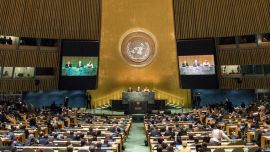This year’s endless election campaign is finally done and dusted, after its result was formalised in Congress last Wednesday, but its perversely polarised binary logic persists, as this week’s intense debate over Bolivia’s upheavals has made all too clear. Almost everybody seems to be reducing Bolivia’s highly complex crisis to a four-letter word – everything hinges on whether there was a “coup” or whether Evo Morales was not the real coup-monger, the architect of his own destruction with his constitutionally cavalier pursuit of presidential eternity.
But instead of elevating a four-letter word into an either/or proposition, a far healthier guide would be two of the oldest axioms in moral discourse: “Two wrongs do not make a right,” and “The end does not justify the means.” Not even the most strident critic of military coups could deny any wrong on the part of the currently exiled Bolivian president. The case against him does not only rest on the strong suspicions surrounding last month’s elections because Evo Morales is a serial offender – already pushing a constitutional reform in the first two of his 14 years in order to raise his ceiling from two terms to three (by not counting his first term as pre-amendment), he submitted yet another term to a 2016 referendum and then blithely ignored his narrow defeat there to manipulate a tame Supreme Court into interpreting his inability to run as a denial of his human rights.
One wrong has thus definitely been around for some 12 years but nobody can seriously deny that the past week’s events supply the second wrong – quite apart from all the progressive kingpins huddling here last weekend, even outgoing President Mauricio Macri’s former foreign minister Susanna Malcorra, not to say his Radical allies, have no compunction about using the word “coup” or questioning the precarious legitimacy of the new authorities. And once a coup is admitted, it is end of discussion as Argentines should know before anybody else. Perhaps no government can have been more awful nor begging to be put out of its misery than the pathetic Isabel Perón presidency in 1976, yet nobody should need to be told what came next.
At this stage both sides might like to switch the debate from two wrongs making a right to the end justifying the means. Memories of the 1976-1983 military dictatorship would crush the notion that there could be such a thing as a good coup but admirers of Evo Morales might fancy their chances from the way his regime has taken Bolivia from abject poverty to almost being a middle-income economy with a real government, quadrupling economic output and raising living standards, from almost two-thirds below the poverty line and over a third destitute when the Aymara trade union militant came to power in early 2006 to 36 percent below the poverty line and under 20 percent destitute today (the former figure comparable to Argentina). Even his contempt for electoral setbacks might be countered along these lines with the argument that his achievements in empowering the 60 percent indigenous majority of the Plurinational State of Bolivia make him a democrat in a broader sense.
But in conclusion, Argentines should be the last people applying the binary logic of this electoral year to the Bolivian crisis, for reasons going beyond the 1976 coup. Precisely because of Argentine history President Macri should not be so coy about calling a spade a spade and condemning the military intervention in Bolivia – a sensitivity to both the dark track record of military coups and the far more creditable chapters of airing the past dictate such a course. But Argentina’s experience of elected dictatorship should also make us wary of ignoring the fact that Bolivia today is a classic example of two wrongs not making a right – Argentina has had some good decades in both this and the last century, like Bolivia until 2014, but in the long run institutional decay has contributed as much or more to our country’s current calamitous state than the outgoing government. Ends never justify means, in the end.


















Comments